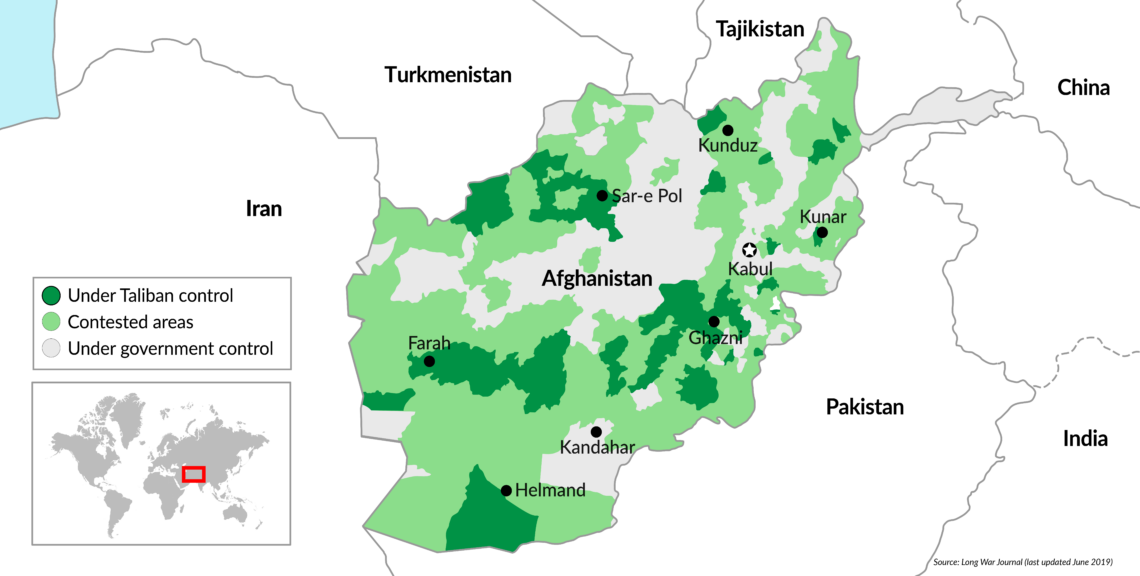The U.S.-Taliban peace process: Uncertain but not moribund
The U.S. long-standing policy on Afghanistan has been that a lasting settlement there will require the involvement of the Taliban. In September, however, talks between the two sides broke down. With an election coming up, many wonder if President Trump plans to stay the course or opt for a quick exit.

In a nutshell
- Talks between Washington and the Taliban have broken down
- President Trump has signaled that he wants to stay the course
- A U.S. withdrawal from Afghanistan is unlikely
At the core of the United States’ Afghanistan policy is the recognition that a long-term, sustainable solution to the conflict there requires the Taliban to be included in the peace process. The collapse of talks between Washington and the Taliban at the beginning of September was a significant but predictable setback. The U.S. is unlikely to withdraw from Afghanistan in the near term and will probably not abandon diplomacy. However, Afghanistan held a presidential election at the end of September (the final results will not be known until October 17) which slowed down the diplomatic track. For now, the U.S. will likely retain its presence in the country.
How close the U.S. was to a deal remains subject of conjecture, but the broad outlines of the agreement were known. The lead U.S. negotiator, Ambassador Zalmay Mamozy Khalilzad, had crafted a deal that called for direct peace talks between the Afghan government and the Taliban; the Taliban agreeing to renounce links to transnational terrorist groups including al-Qaeda and Islamic State (also known as ISIS or Daesh); a limited cease-fire; and the reduction of U.S. forces to about 9,000 troops. (Currently, there are about 14,000 U.S. troops in the country, providing advice and support to the Afghan military, as well as conducting counterterrorism missions.) It was likewise expected that other allies (39 states with approximately 17,000 troops) would reduce their forces proportionally.
The Afghan government was frustrated that it was not included in the talks. In the spring, the U.S. began a round of consultations with the Afghans on security assistance after the deal and the parameters for Afghan-Taliban negotiations. Moreover, the U.S. broadened the discussions with India and other regional and NATO partners.
High hopes
Senior officials in the U.S. State Department believed a deal was close despite the deep reservations held by then-National Security Advisor John Bolton. The Defense Department’s concerns were largely addressed when President Donald Trump committed to a residual force of several thousand to continue the advice and assistance mission. The number of U.S. forces remaining in the country would have been about the same as when President Trump entered office.
President Trump has frequently stated his desire to disengage from Afghanistan.
Though the president had publicly and frequently stated his desire to disengage from Afghanistan, it is not clear that he ever saw the final deal or that he ordered the negotiations to be concluded. Nevertheless, the administration invited Afghan and Taliban leaders to the presidential retreat at Camp David in Maryland. The hope, no doubt, was to invoke the spirit of the 1978 Camp David Accords (which led to the 1979 Egypt-Israel Peace Treaty) and to use the occasion to press both sides to follow through on peace talks.
Nor is it clear whether the Taliban ever accepted the president’s invitation to Camp David. Regardless, the president publicly withdrew the offer following a September 3, 2019, terrorist attack in Kabul for which the Taliban claimed responsibility. The administration also announced that it was suspending negotiations.
Shortly after that, Mr. Bolton left as a national security advisor. While reports suggested that a discord over the Afghan negotiations precipitated the departure, both President Trump and Mr. Bolton have acknowledged his tenure ended because of continued disagreements over a range of issues.
Steady strategy
Mr. Bolton’s resignation likely means less for the progress of future talks than many assume. The president’s fundamental policy approach has not changed. The U.S. does not believe the Afghan government can secure the country through military victory. However, in showing their willingness to come to the table, the Taliban acknowledged that they know they cannot win as long as the U.S. continues to support the Afghan regime.
Facts & figures
Afghanistan: Struggle for control

The administration also knows that the Taliban saw the negotiations as an opportunity to get the U.S. to leave, opening the way for them to attempt to take over the country. The U.S. was aware that the Taliban had been communicating with associates worldwide, informing them that their return to power was imminent. For the U.S., the challenge was both to conclude the deal and maintain a sufficient presence to convince the Taliban that they would not be able to return to power by force.
There is no sign that President Trump has abandoned this strategy. In fact, by pulling back from negotiations after the Kabul attack and endorsing the presidential elections, the U.S. sent the message that it was not desperate for a quick exit.
Personnel changes
The U.S. thinks it is negotiating with the right Taliban leaders – those who can deliver on a deal. The administration may, therefore, be unwilling to cut off diplomacy completely, despite the setback. It might also be reluctant to replace its chief negotiator, Ambassador Khalilzad, who has many critics in both the U.S. and Afghan governments. They argue he gave away too much to the Taliban during the negotiations and did not sufficiently consult with other government officials, allies or the Afghan government. He is, however, experienced and well-known by the Taliban, and is supported by Secretary of State Mike Pompeo. Ambassador Khalilzad’s fate remains uncertain. He recently held talks with Taliban leaders in Pakistan.
American politics may have less to do with the pace of negotiations than many think.
American politics may have far less to do with the pace of negotiations than many assume. While there are calls in the U.S. to stop “America’s endless wars,” in practice, Afghanistan is not an issue on most American voters’ minds. Furthermore, while the president would like to conclude an agreement so he can trumpet his negotiating skills, he also recognizes the danger of cutting a bad deal that makes him look weak and ineffective. Mr. Trump remembers that former President Barack Obama’s premature withdrawal from Iraq precipitated the rise of Islamic State. He will likely want to pursue a low-risk course of action.
More changes in the senior national security team may push the Afghanistan issue further onto the back burner. President Trump recently appointed Robert O’Brien as his new national security advisor. Mr. O’Brien is an experienced foreign policy hand, well-known in conservative and Republican circles. He is unlikely to have an immediate impact.
It is widely rumored that Secretary of State Mike Pompeo might leave government, perhaps as late as May of next year, to run for the U.S. Senate in the state of Kansas. It has been reported that U.S. negotiator Steve Biegun will be nominated as deputy secretary of state with current deputy John Joseph Sullivan moving to Moscow as the U.S. ambassador. If Secretary Pompeo does leave, U.S. Ambassador to China Terry Branstad may be asked to serve as acting secretary. Much of this is speculative, but such turmoil would not leave much room to revamp policies on Afghanistan. Inertia will likely take hold.
The Taliban may be hoping for a new U.S. president who might want to withdraw.
It is unclear if the current impeachment proceedings in Congress will impact administration plans. It is unlikely that they will: unless new and more significant information emerges, the proceedings will likely finish by the end of the year, concluding with the president remaining in office and his foreign policies largely intact.
Scenarios
The most likely scenario is that the U.S. will maintain its current policy, continuing to support the Afghan government and keeping the option of renewing talks with the Taliban open.
Having been rebuffed by President Trump, the Taliban could wait to see the results of the U.S. elections. They may hold out hope for the Trump administration to move for a swift withdrawal after the elections, or for a new U.S. president who might be inclined to withdraw.





